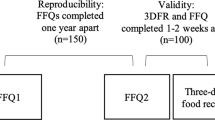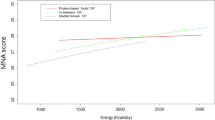Abstract
Objective: The study was conducted to assess the relative validity of a 170-item semiquantitative food frequency questionnaire (SFFQ) adapted for use in the elderly.
Design and subjects: The study was carried out in a sample of 80 men and women aged 55–75 y participating in a community based prospective cohort study in Rotterdam, The Netherlands. The two-step dietary assessment comprised a simple self-administered questionnaire (20 min) followed by a structured interview with trained dietitians (20 min) based on the completed questionnaire. Multiple food records (FR) collected over a one year period served as reference method. 24 h urine urea was used as indirect marker for protein intake.
Results: Compared with FR, the SFFQ generally overestimated nutrient intake as reflected by difference in means and the ratio of SFFQ to FR. Energy adjustment reduced the observed overestimation. Pearson’s correlation coefficients varied from close to 0.5 to about 0.9 for crude data, and after adjustment for age, sex, total energy intake, and for within-person variability in daily intake for 0.4–0.8. Cross-classification into quintiles resulted in correct classification into the same or adjacent quintile of 75.8% for crude and 76.8% for energy-adjusted data. Validation of protein intake estimated by SFFQ with protein excretion from 24 h urine urea indicated overestimation of protein intake by SFFQ. Spearman correlation coefficient between protein intake estimated from urea excretion and SFFQ was 0.67.
Conclusions: Adaptation of a SFFQ for use in the elderly resulted in a valid and time-efficient dietary assessment instrument. Its ability to adequately rank study subjects according to their dietary intake support its application in epidemiological studies in the elderly.
Sponsorship: ROMERES and Akzo Nobel, the Netherlands; K. Klipstein-Grobusch was supported by the Ministry of Research, Culture, and Science of the Federal State of Brandenburg, Germany.
This is a preview of subscription content, access via your institution
Access options
Subscribe to this journal
Receive 12 print issues and online access
$259.00 per year
only $21.58 per issue
Buy this article
- Purchase on Springer Link
- Instant access to full article PDF
Prices may be subject to local taxes which are calculated during checkout
Similar content being viewed by others
Author information
Authors and Affiliations
Rights and permissions
About this article
Cite this article
Klipstein-Grobusch, K., den Breeijen, J., Goldbohm, R. et al. Dietary assessment in the elderly: validation of a semiquantitative food frequency questionnaire. Eur J Clin Nutr 52, 588–596 (1998). https://doi.org/10.1038/sj.ejcn.1600611
Received:
Revised:
Accepted:
Published:
Issue Date:
DOI: https://doi.org/10.1038/sj.ejcn.1600611
Keywords
This article is cited by
-
Components in downstream health promotions to reduce sugar intake among adults: a systematic review
Nutrition Journal (2024)
-
The healthy beverage index is not associated with insulin resistance, prediabetes and type 2 diabetes risk in the Rotterdam Study
European Journal of Nutrition (2023)
-
MIND diet and the risk of dementia: a population-based study
Alzheimer's Research & Therapy (2022)
-
Long-term intake of total energy and fat in relation to subjective cognitive decline
European Journal of Epidemiology (2022)
-
Prenatal exposure to trans fatty acids and head growth in fetal life and childhood: triangulating confounder-adjustment and instrumental variable approaches
European Journal of Epidemiology (2022)



